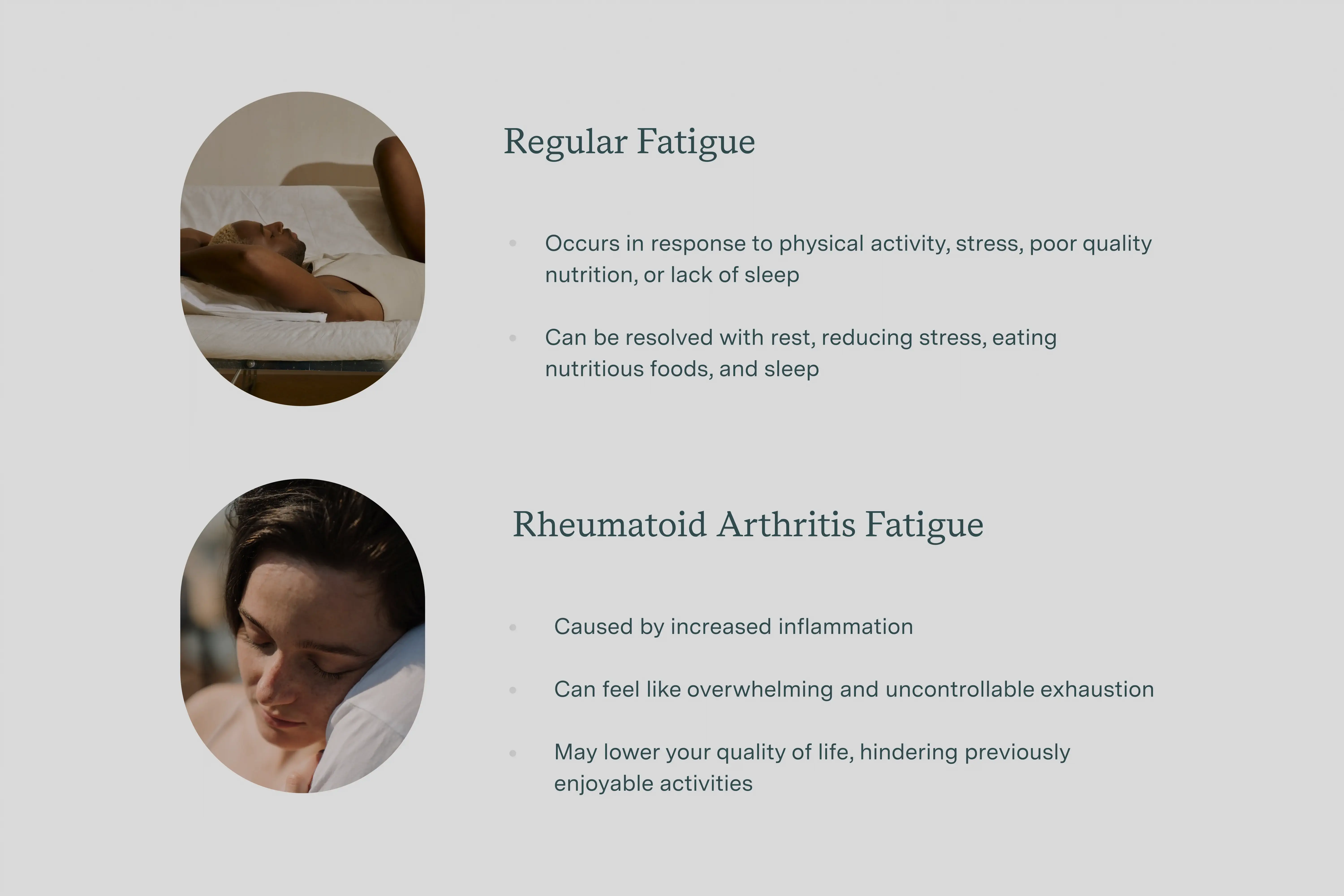Approximately 1.3 million people in the United States live with rheumatoid arthritis (RA), meaning they also are living with constant inflammation, which can be described as painful swelling throughout their body. (Source)
When we think of inflammation, we often think about the visual side of it, such as a swollen lymph node or an inflamed joint. However, RA causes inflammation all over the body, including in places we can’t always see.
For most people, inflammation isn’t always bad. It’s the body’s way of responding to and healing an injury, infection, or something “not normal” such as a mosquito bite. However, for people with an autoimmune condition such as RA, the immune system attacks healthy cells in the body that it shouldn’t. The result can be painful chronic inflammation as well as other symptoms including extreme feelings of tiredness, or fatigue.
While there are many reasons why you might feel fatigued, it’s important to know if RA is the cause. Lifestyle changes could help combat RA fatigue and keep inflammation under control, alleviating that debilitating feeling of being overly tired, preventing more serious complications, and helping improve your quality of life.
 9 (1) (1).webp)
What is RA?
Rheumatoid arthritis, often referred to as RA, is a chronic inflammatory autoimmune disease in which the body’s immune system mistakenly attacks healthy cells around the joints, causing painful swelling. Although RA mainly attacks the joints, usually many at one time, it can also affect the skin, eyes, heart, kidneys, and lungs. Without treatment it can lead to permanent joint damage and other potentially serious complications. (Source, Source)
As with many autoimmune diseases, it can be difficult to diagnose RA in the early stages. This is because the disease develops over time, symptoms can differ from person to person, and there is no one single test to confirm RA. Symptoms also mimic other conditions, including different types of arthritis that are not autoimmune in nature.
The specific cause of RA is unknown, but there are both genetic and environmental characteristics that can increase or decrease your risk. These include age, genetics, and weight, and exposure to environmental toxins. As with many autoimmune diseases, RA tends to affect women more often than men. (Source)
How Is RA Treated?
While there are many types of arthritis, each is treated differently. Because RA is an autoimmune condition, symptoms often are systemic, or affecting the whole body, as opposed to just certain joints. This can change the approach to treatment.
Rheumatoid arthritis can be treated with both medication and self-management strategies. As with other chronic illnesses, there is no cure for RA. Therefore treatment is intended to reduce the pain and stop or slow further disease progression and damage. Some medications for autoimmune diseases such as RA help stop the body from attacking healthy tissues, slow disease progression, and treat symptoms such as pain and inflammation. Diet and lifestyle changes may also help you manage RA and its symptoms. (Source)

What Are the Symptoms of RA?
Symptoms of rheumatoid arthritis are similar to other conditions and can vary from person to person. This is what makes it a difficult and frustrating condition to diagnose, especially in the early stages. Some people develop symptoms slowly over time, while others develop symptoms rapidly or all at once.
For most, RA mainly affects the joints in the body. It can happen in any joint, but is most common in the wrists, hands, and feet. Unlike other types of arthritis, symptoms often happen on both sides of the body. For example, if you have RA in one hand, you may also develop it in the other. Symptoms tend to flare, or become worse at certain times, because of factors including stress and weather. (Source)
Common joint-related symptoms include:
- swelling
- pain and stiffness
- decreased range of motion
- painful nodules near the joints
There are other symptoms associated with RA that are not joint related. These include:
- fatigue
- weight loss
- digestive issues
- eye and ear issues
- gum disease
- skin problems
- sleep issues
Fatigue, which is considered extreme tiredness that doesn’t resolve with rest, is one of the earliest signs of RA and one of its most common symptoms. In fact, studies have found that people with RA often experience more fatigue than pain. Fatigue can be caused by the increased inflammation in the body that results from RA. Despite this, many may not realize that their RA is actually responsible for their extreme exhaustion. (Source)

.svg)
.png)






.webp)







.webp)



.png)

 (1).webp)









 (1).jpeg)

.webp)
.webp)

.webp)

 (2).webp)

%201 (1).webp)

 2 (1).webp)




.svg)
.svg)